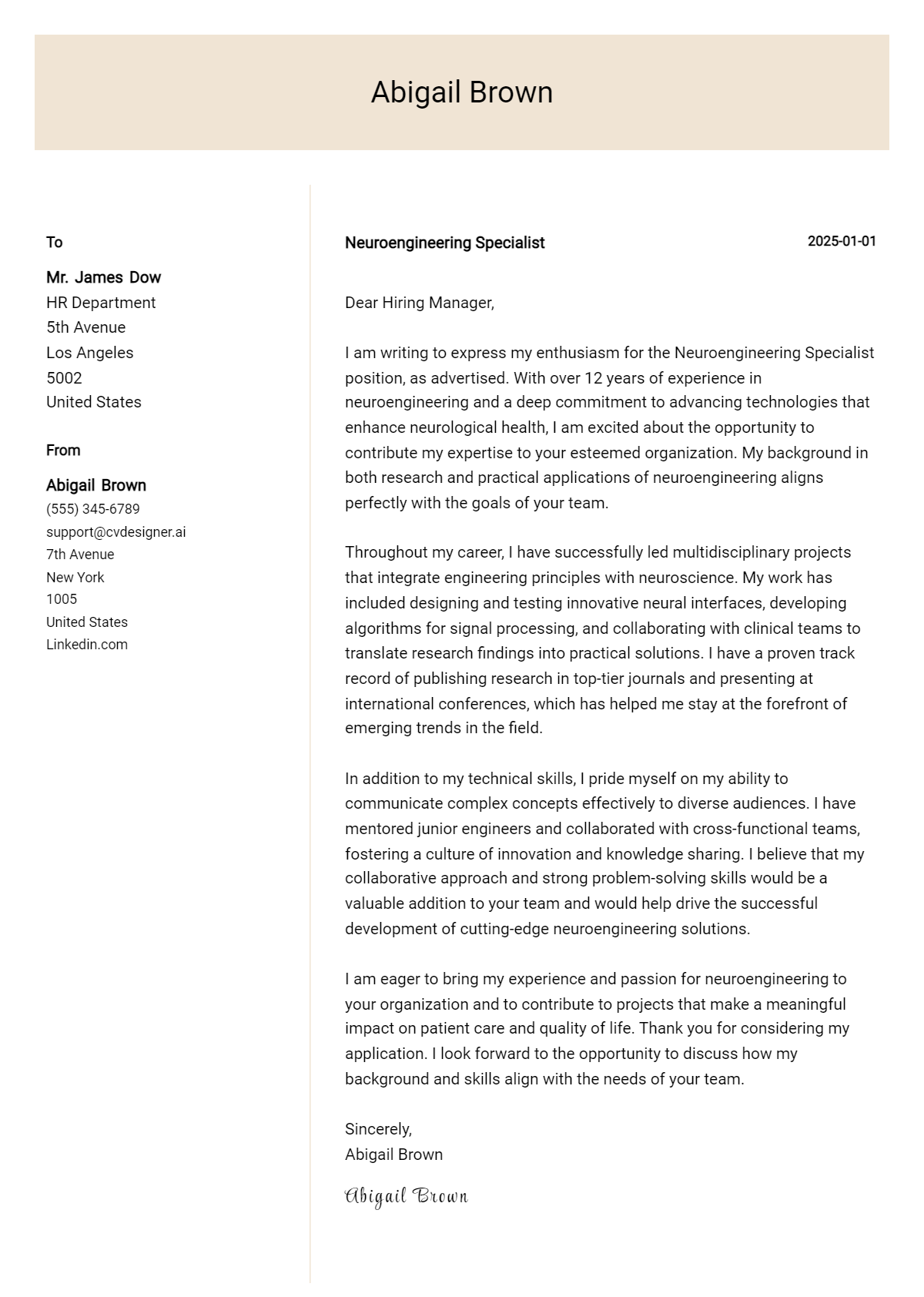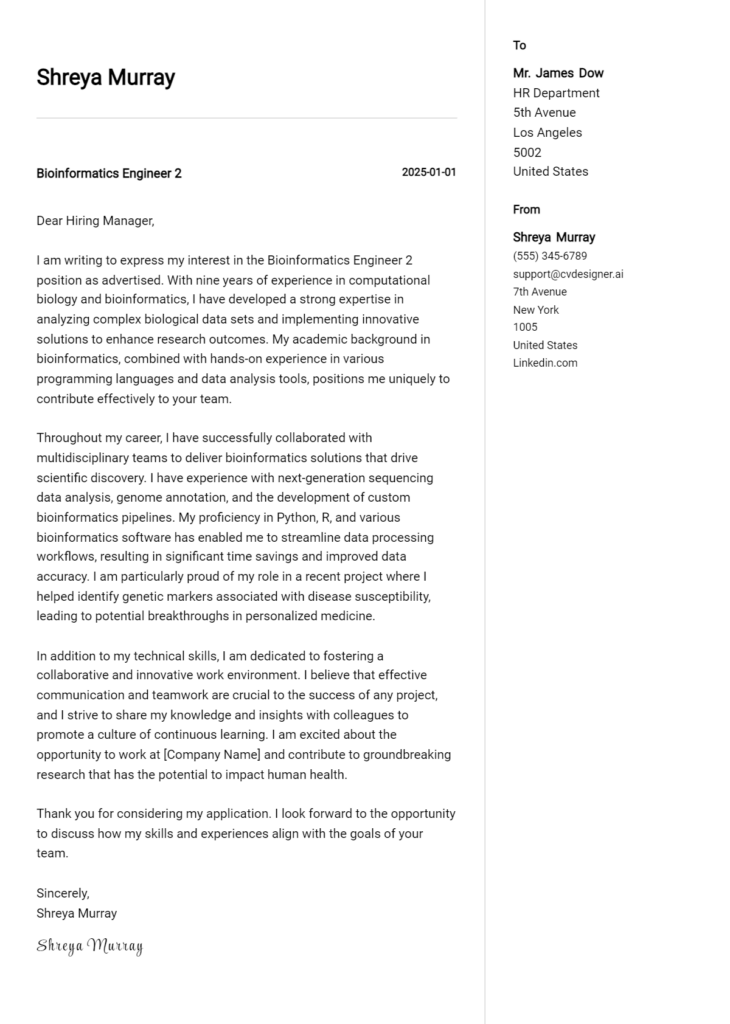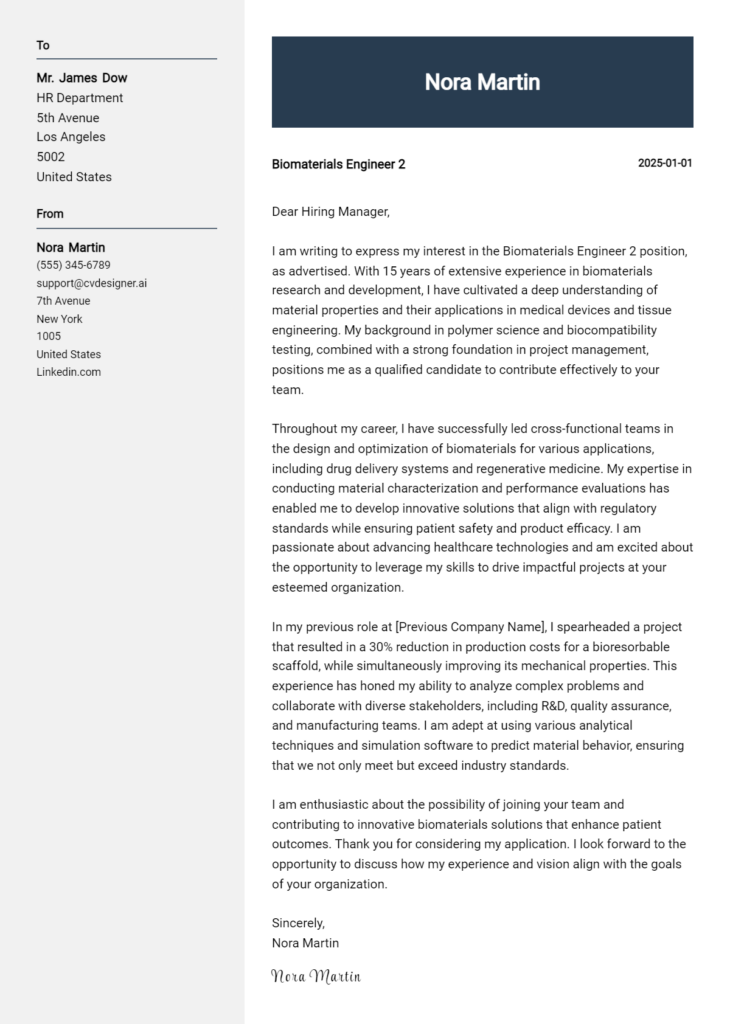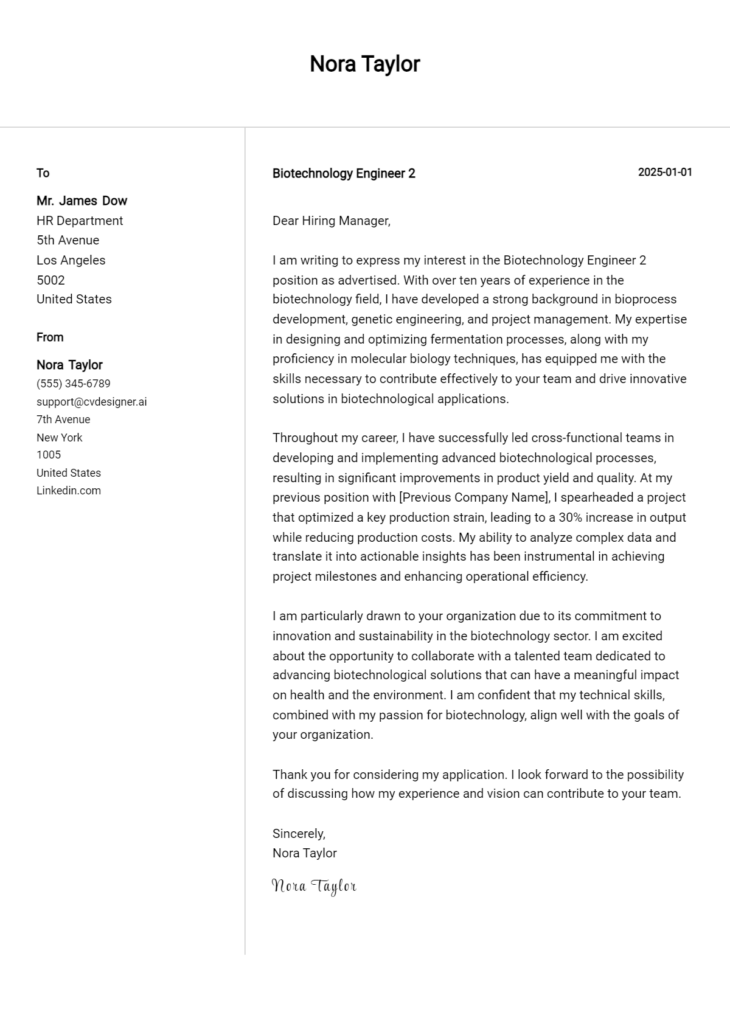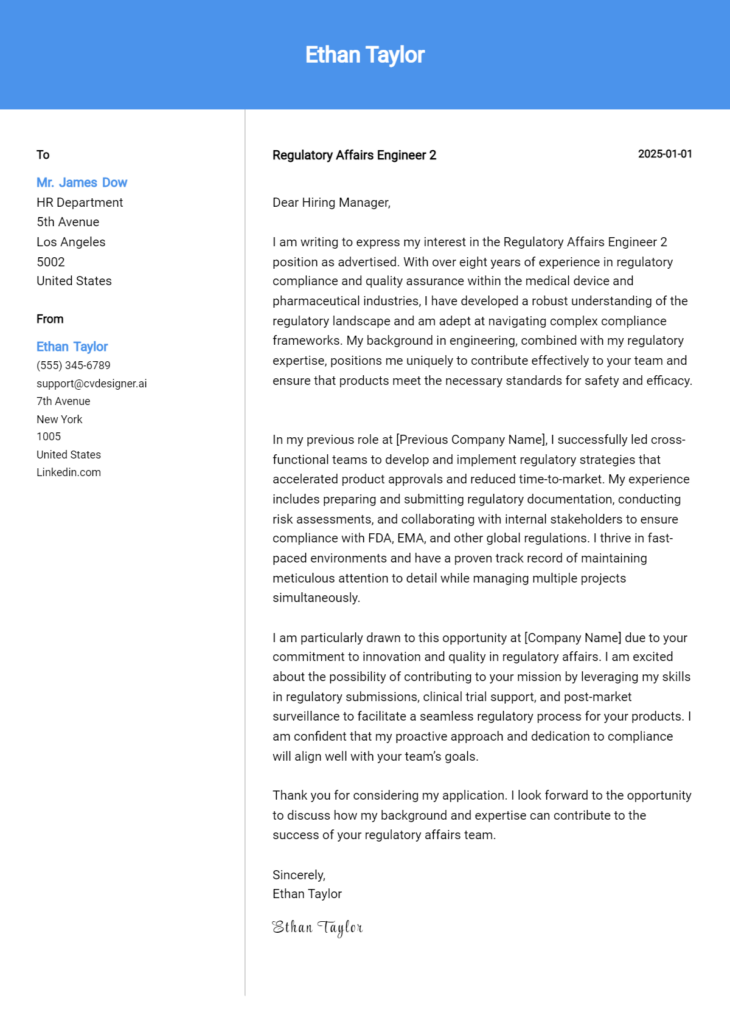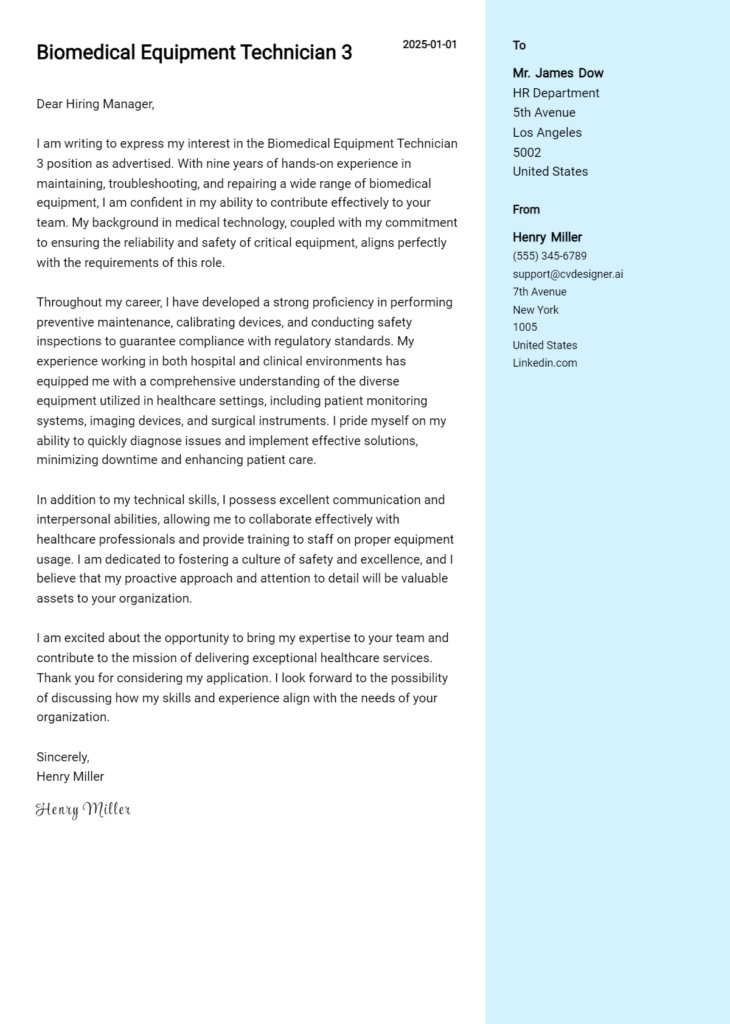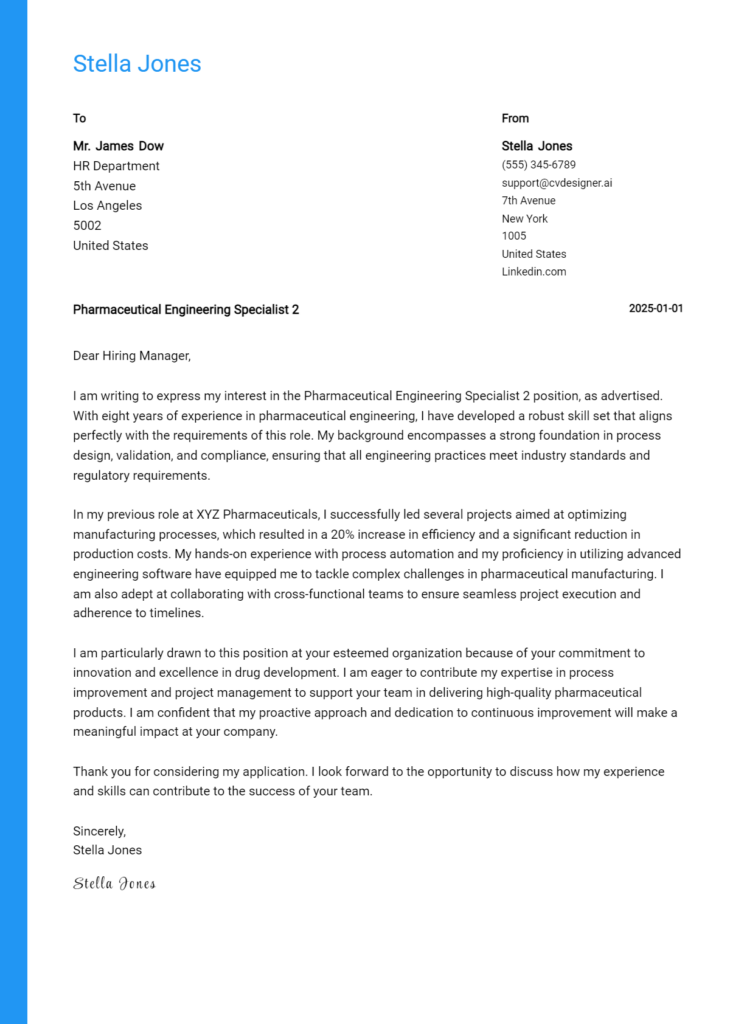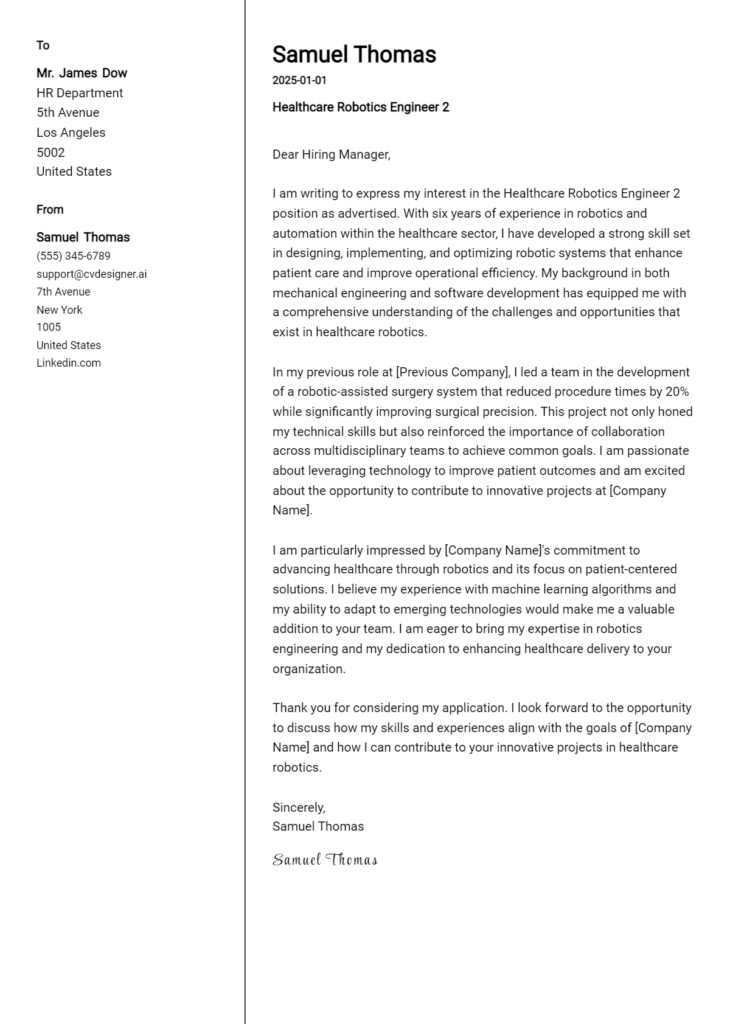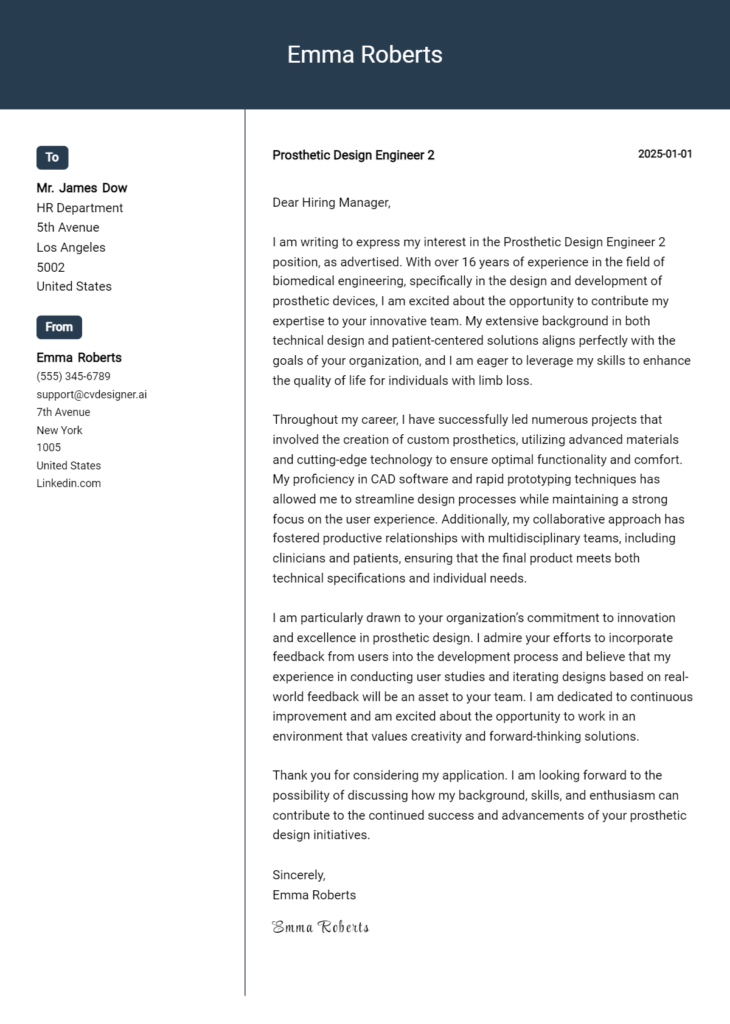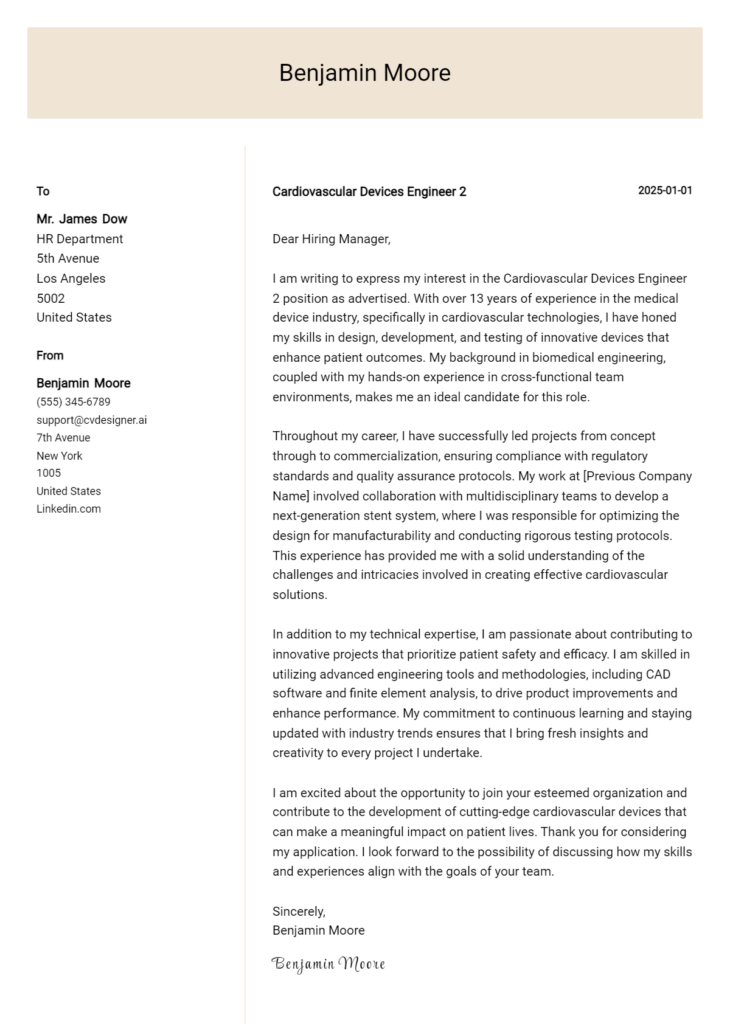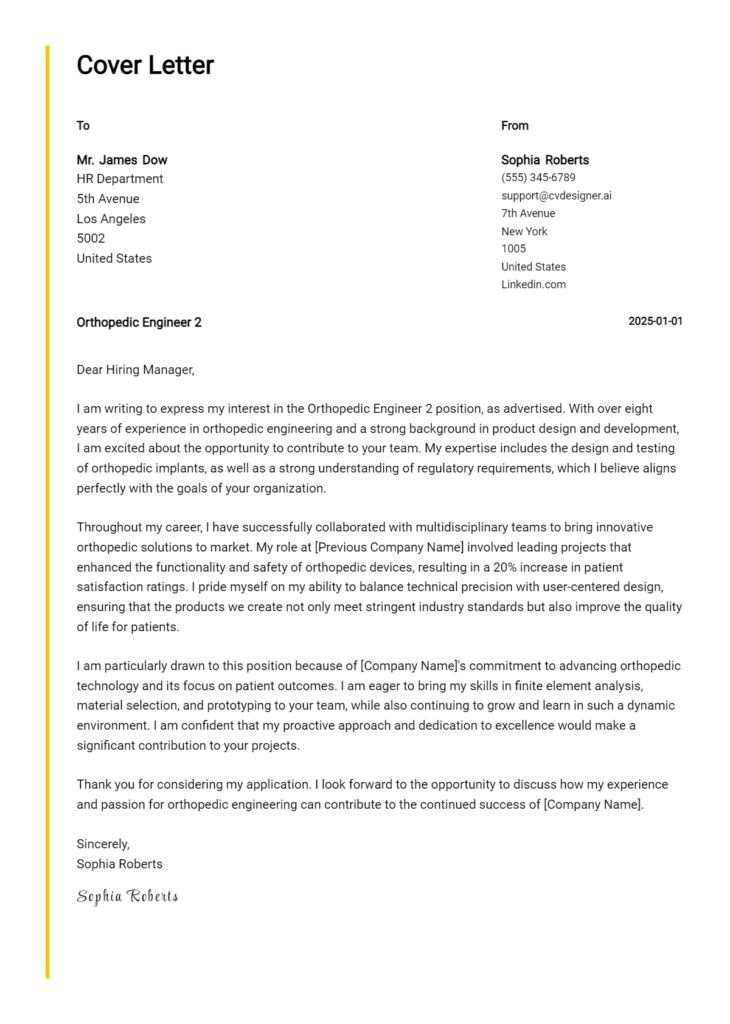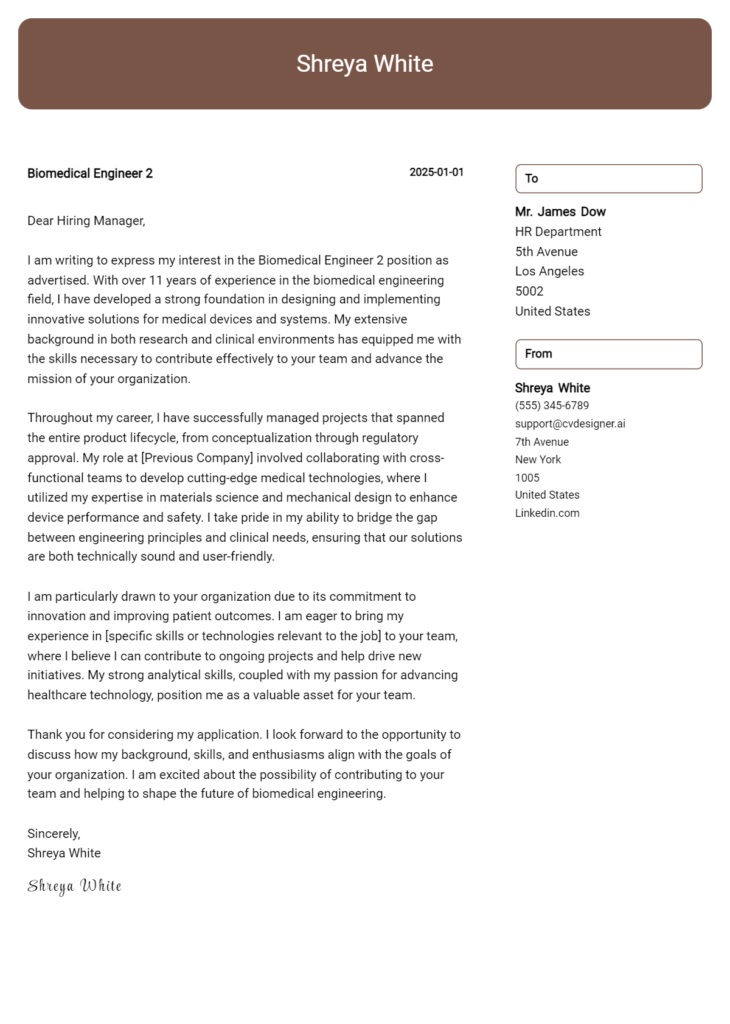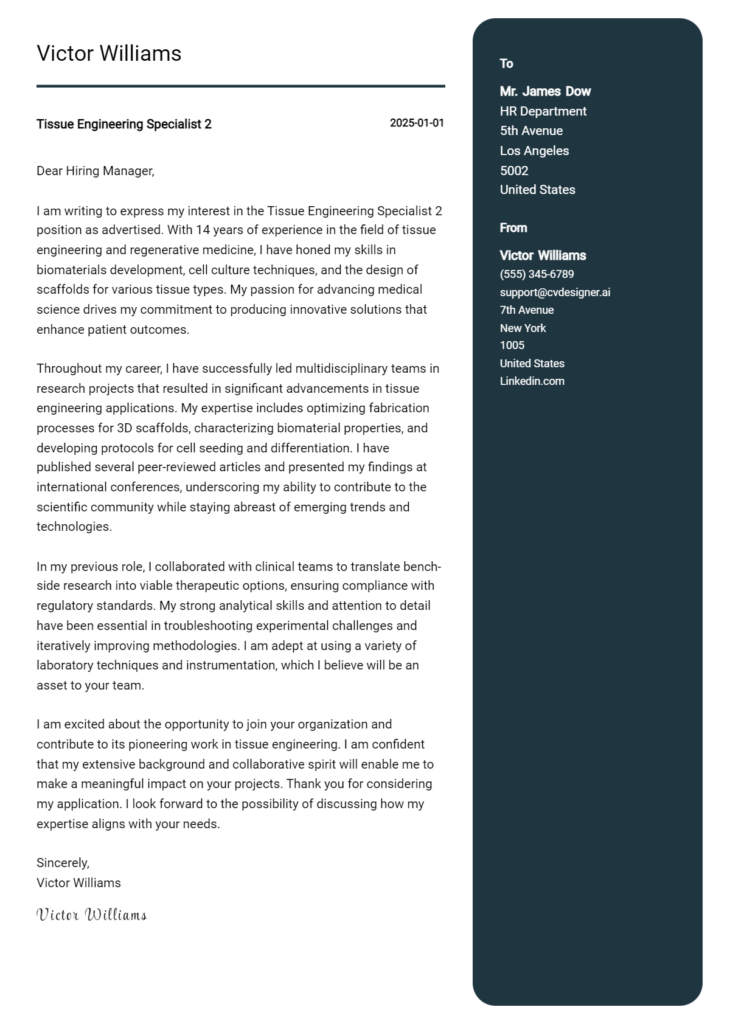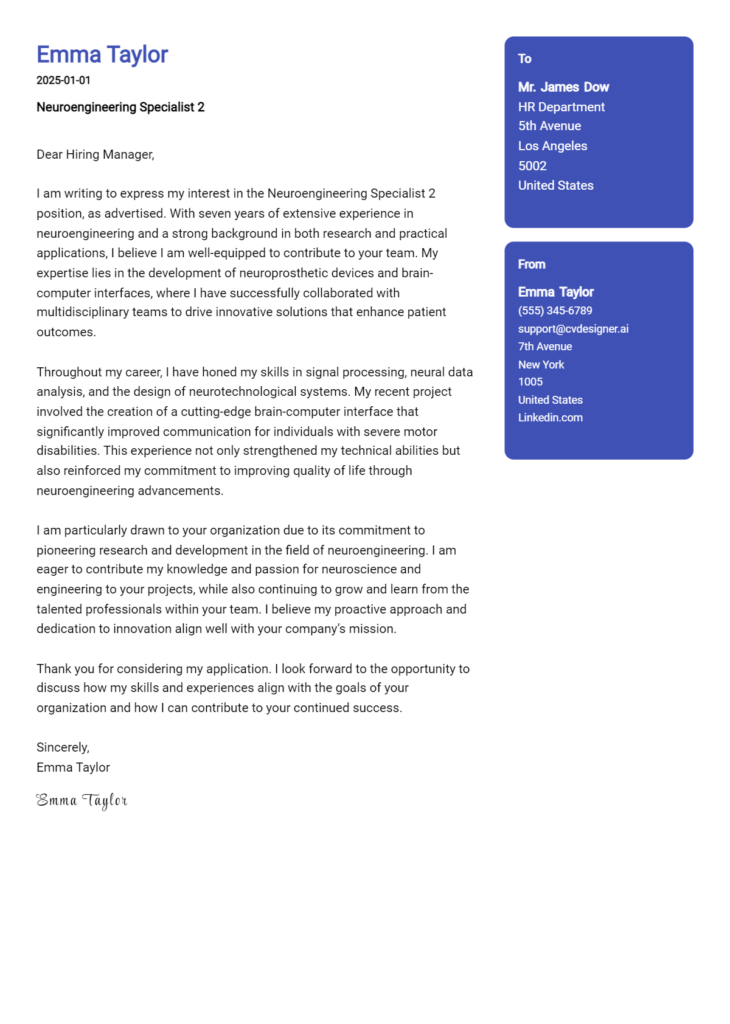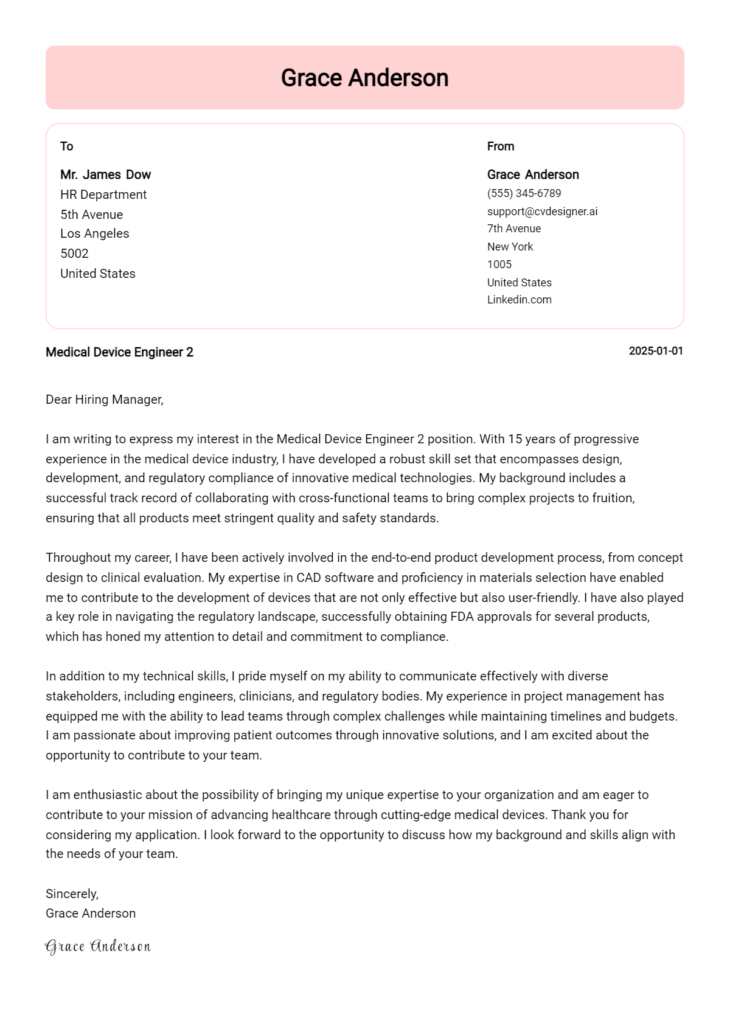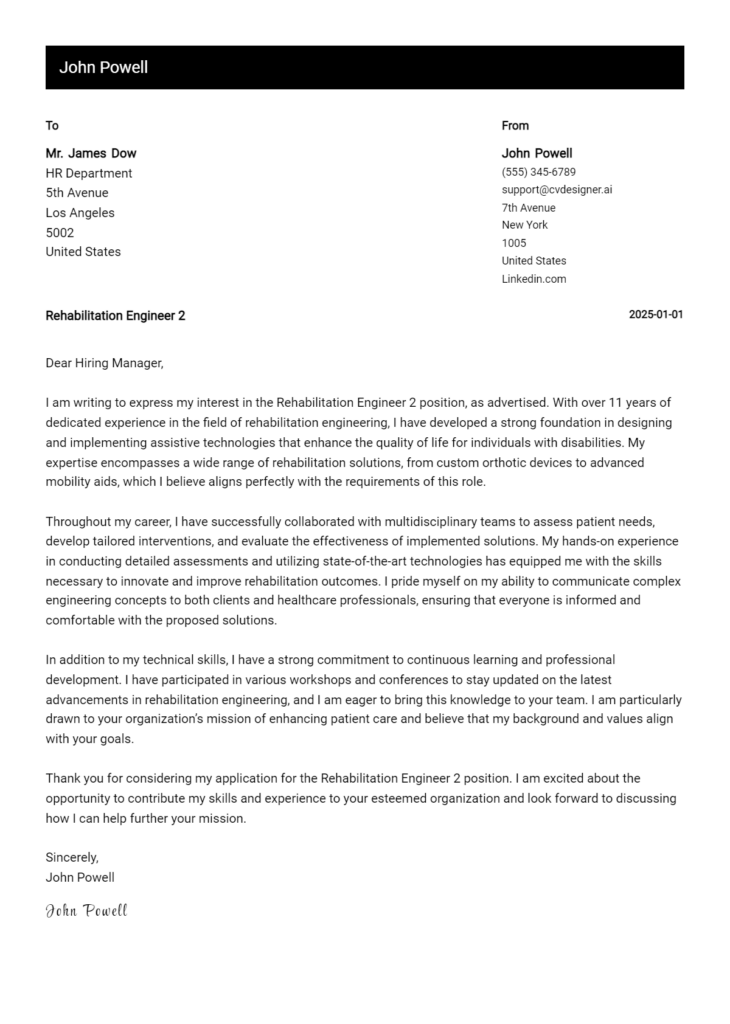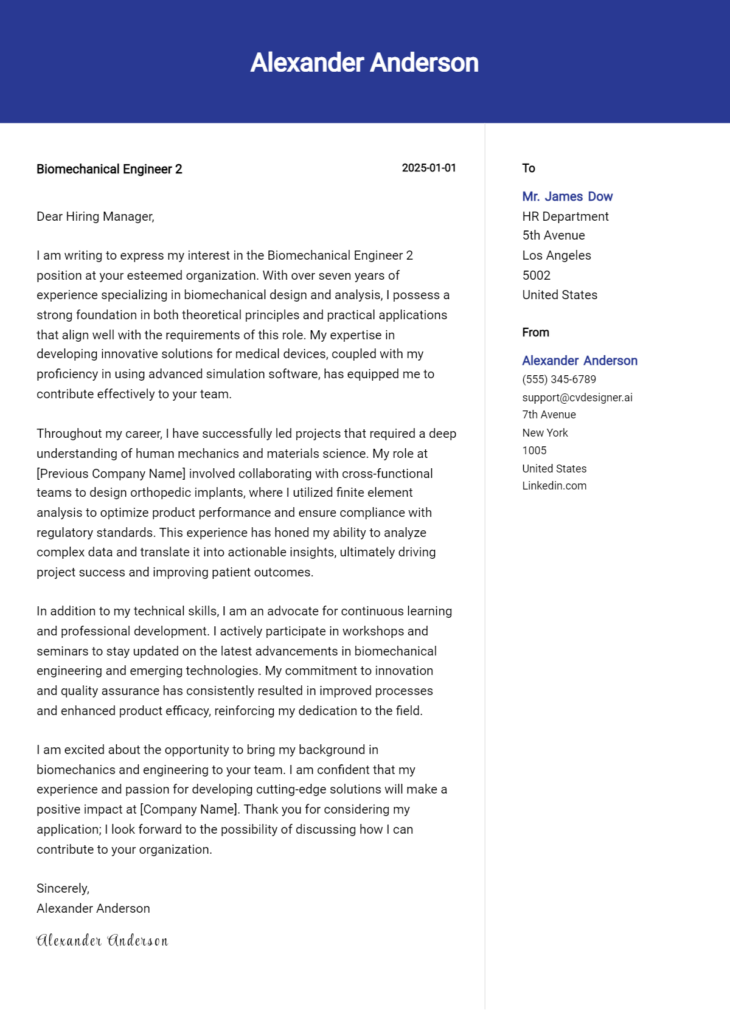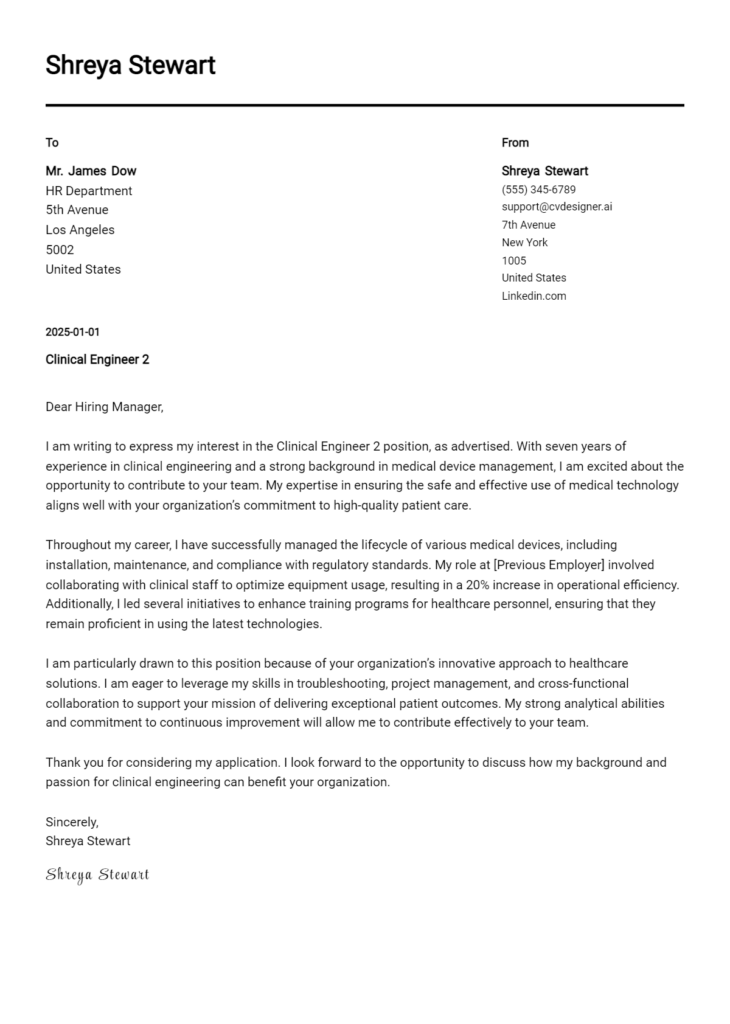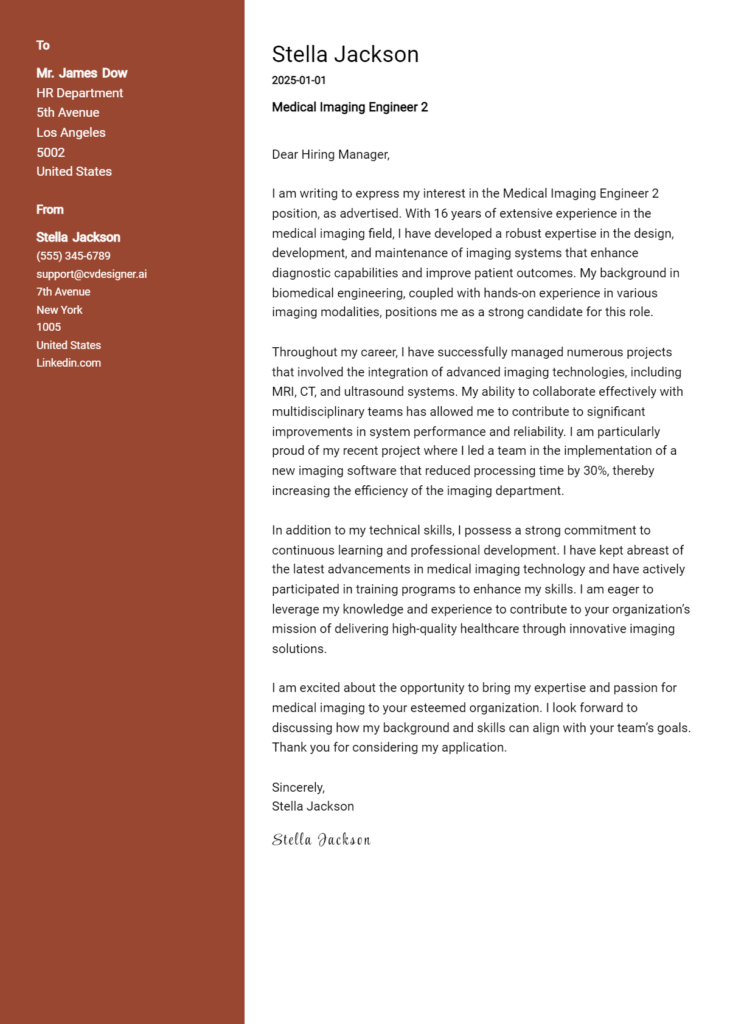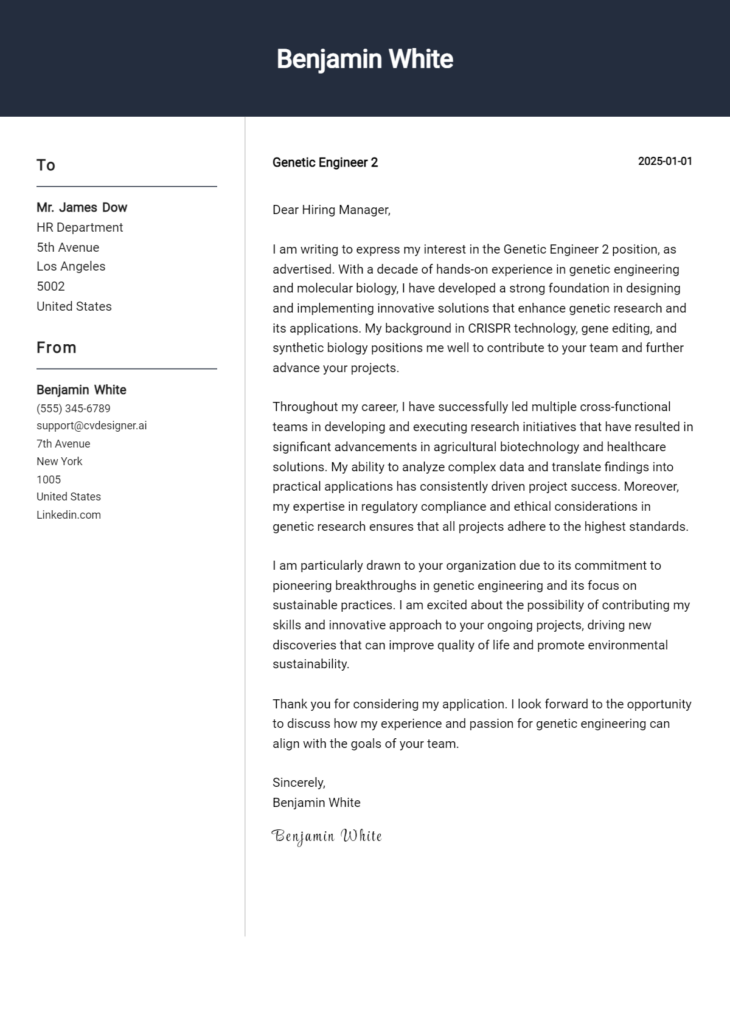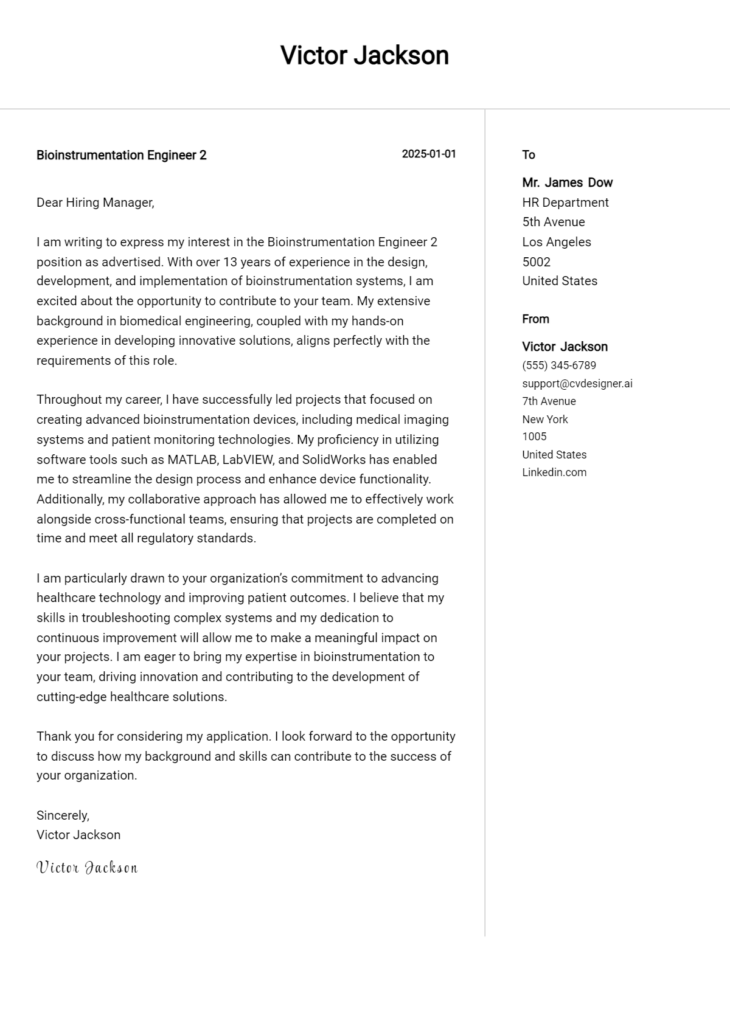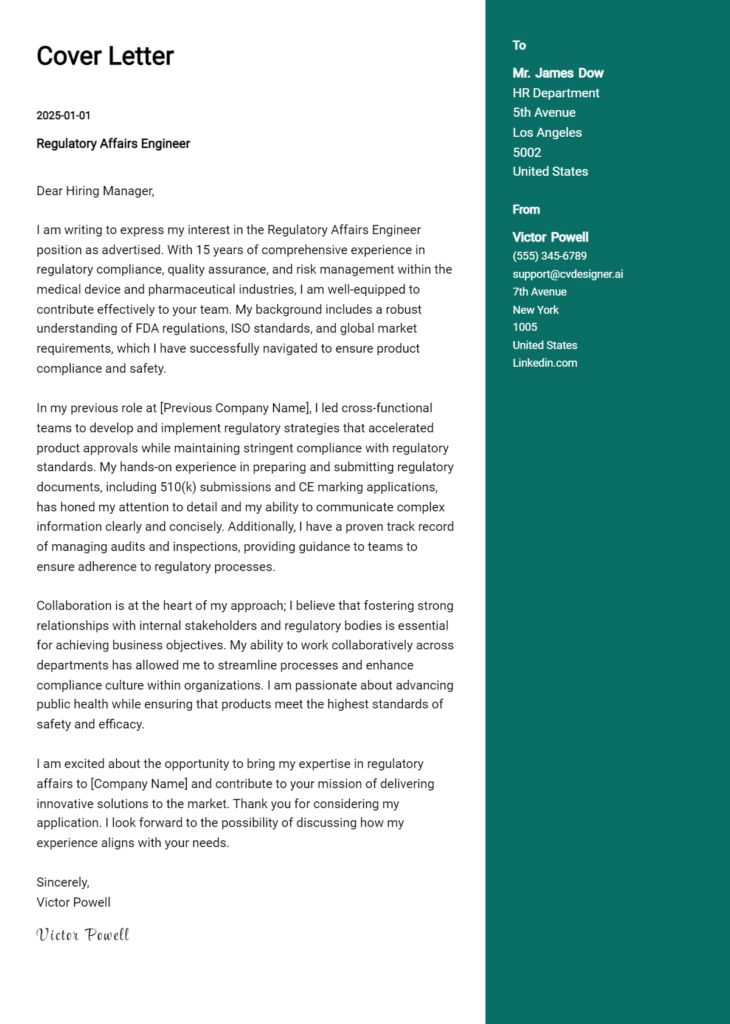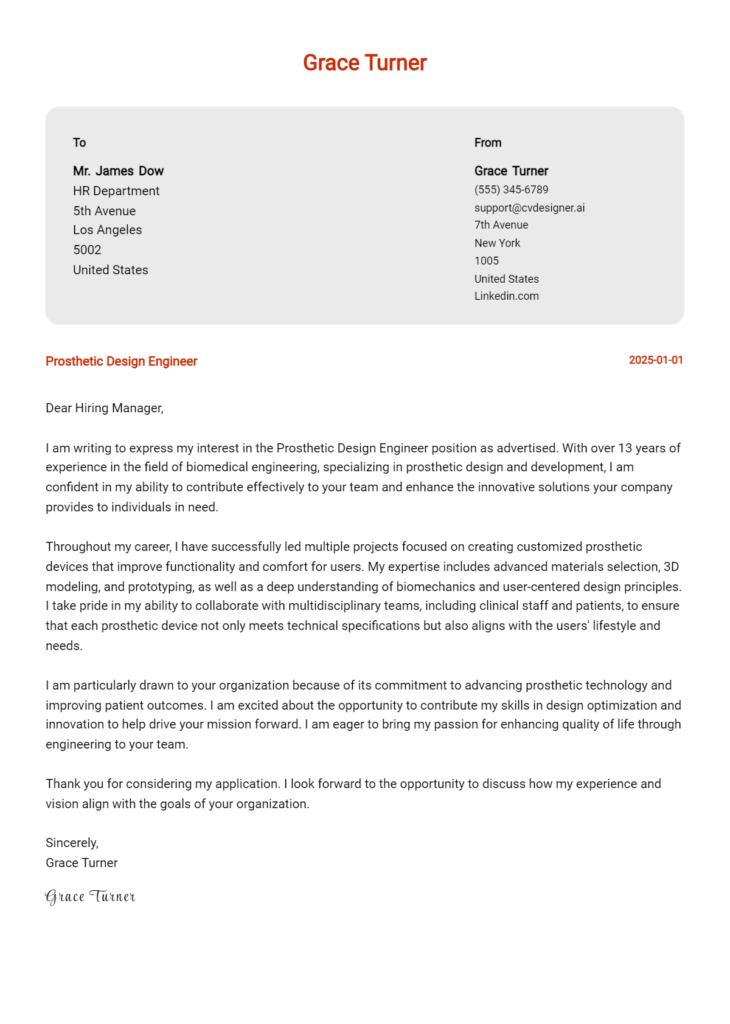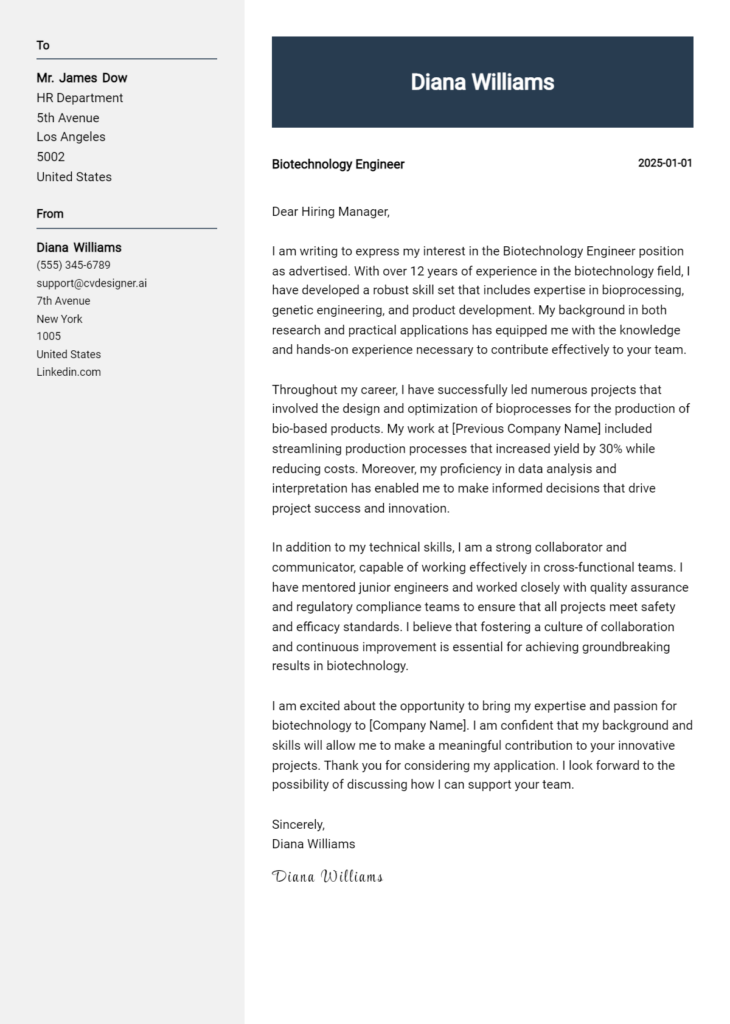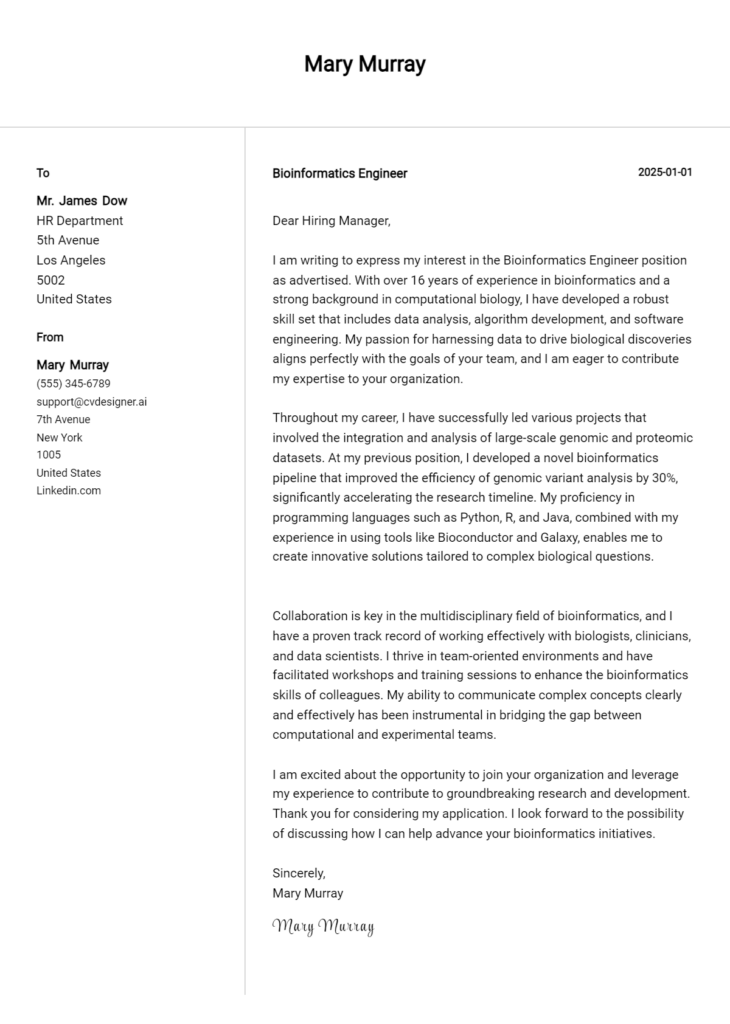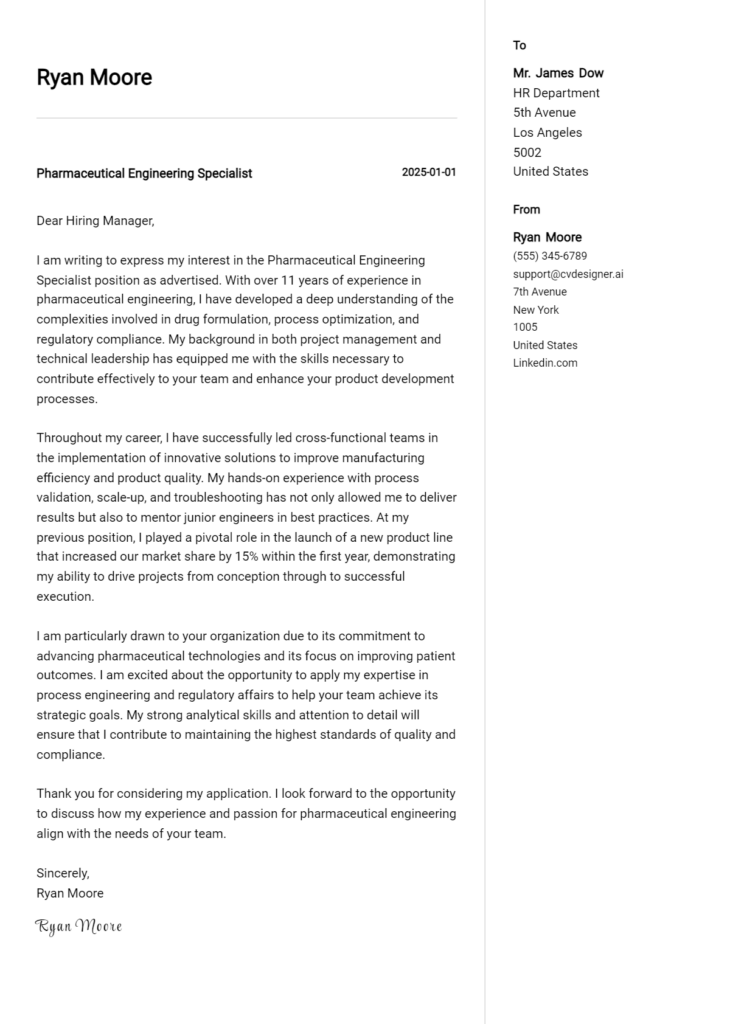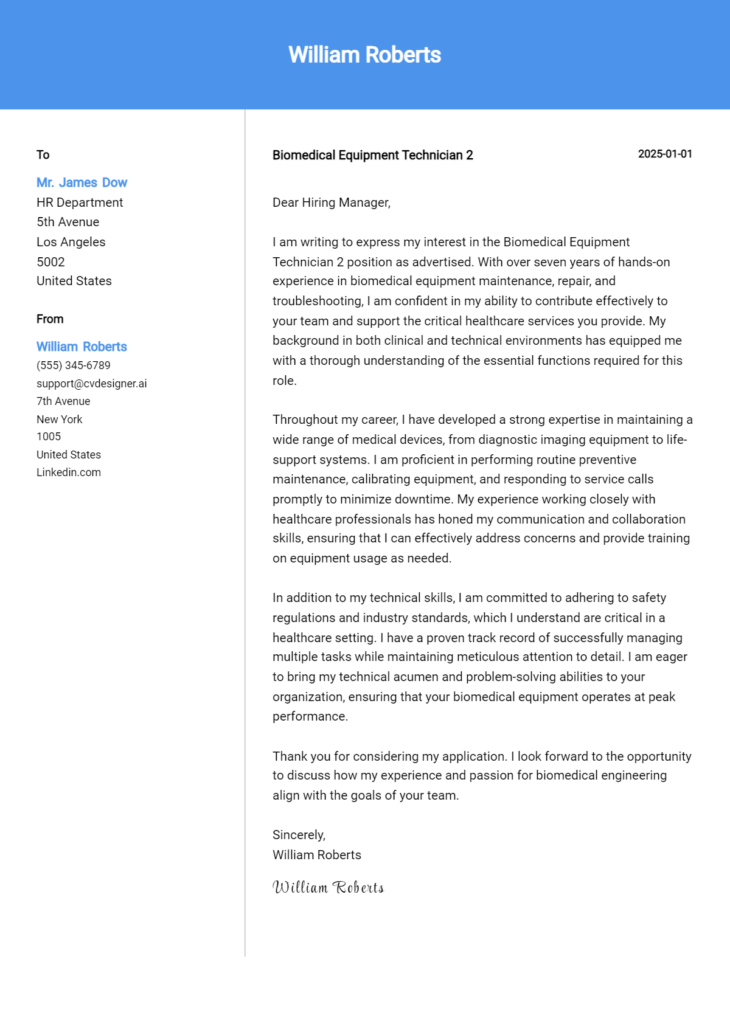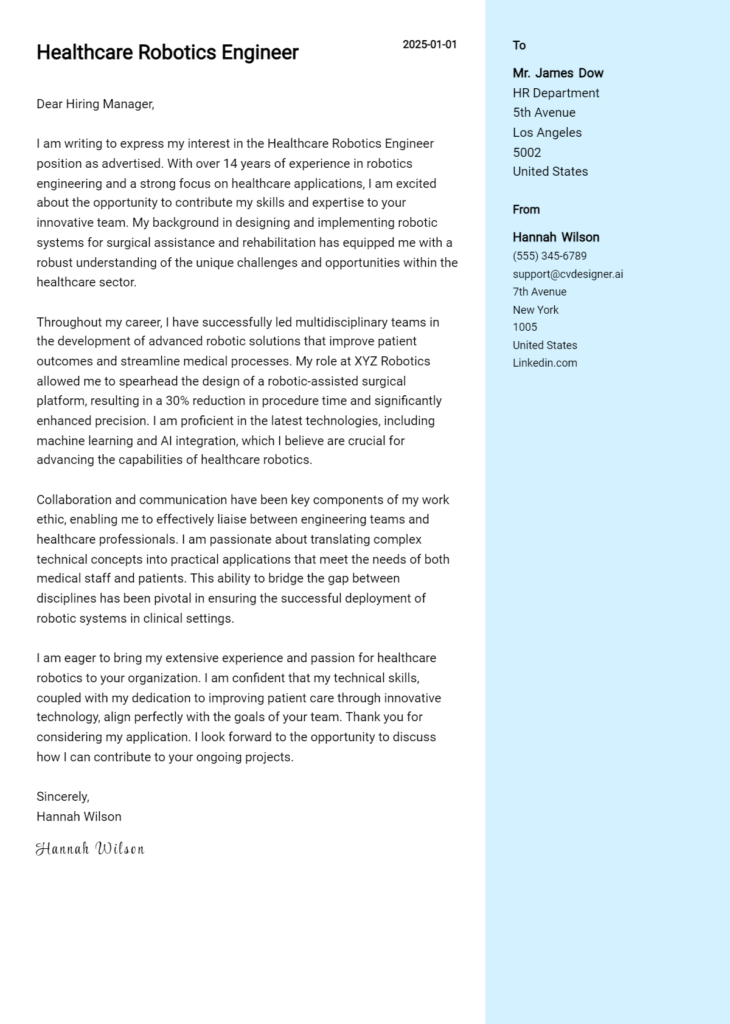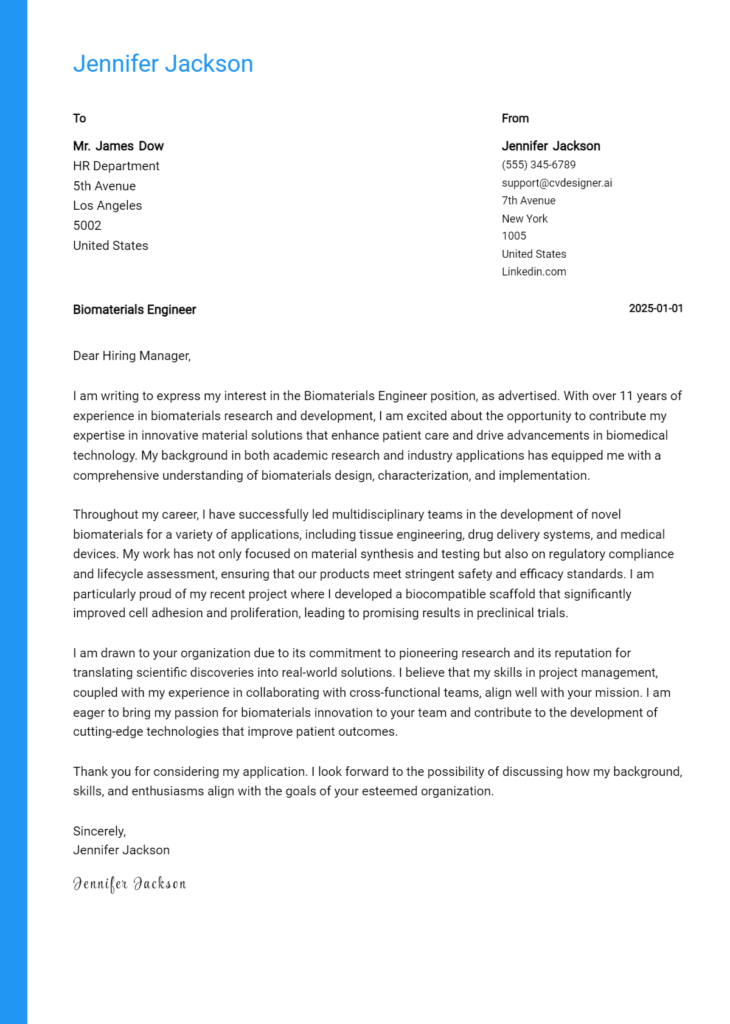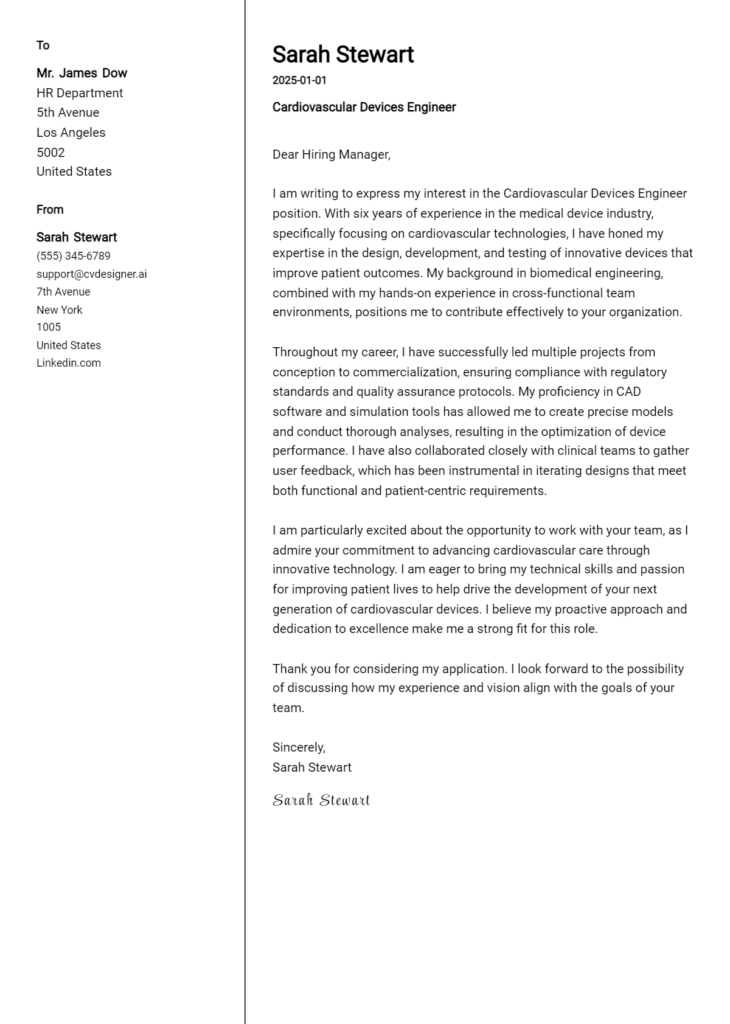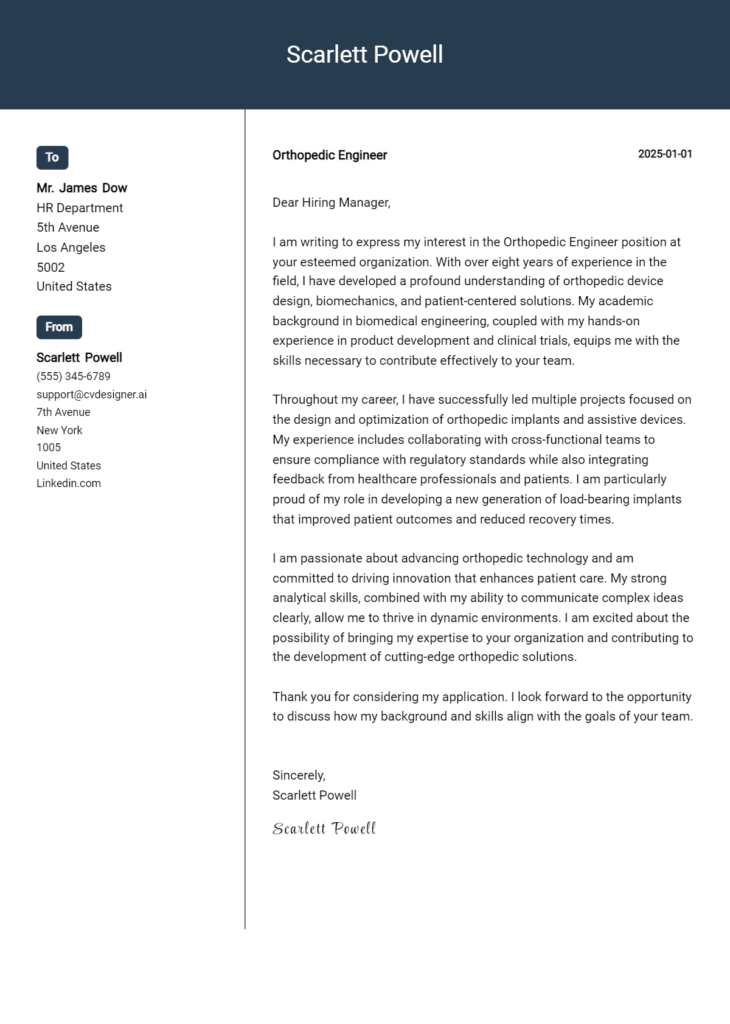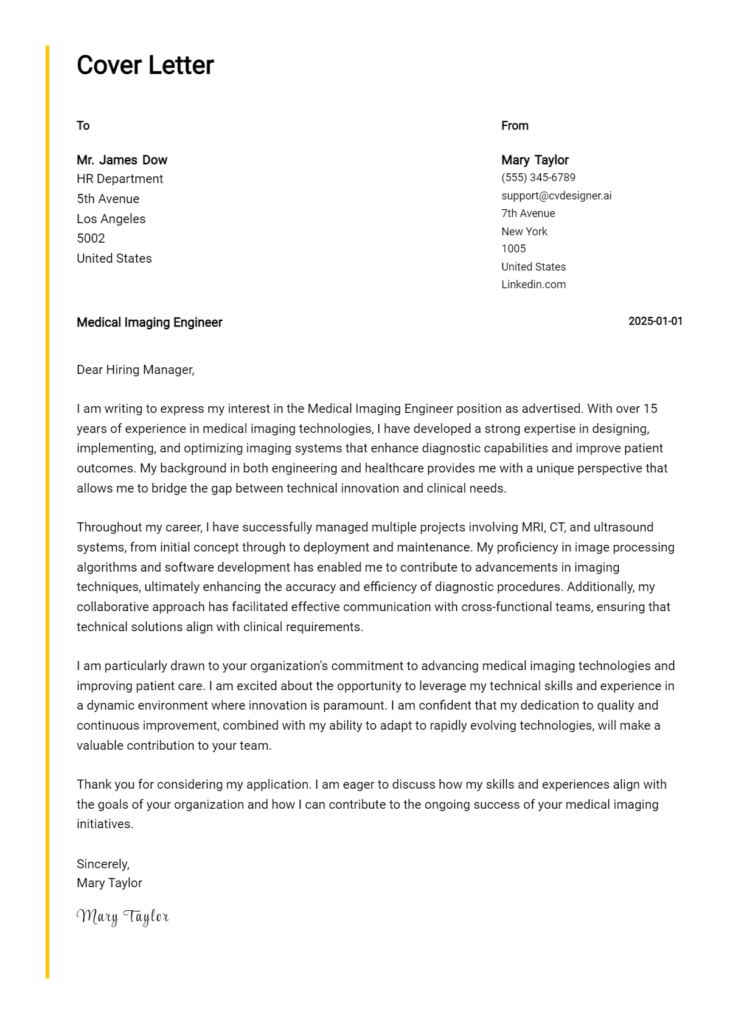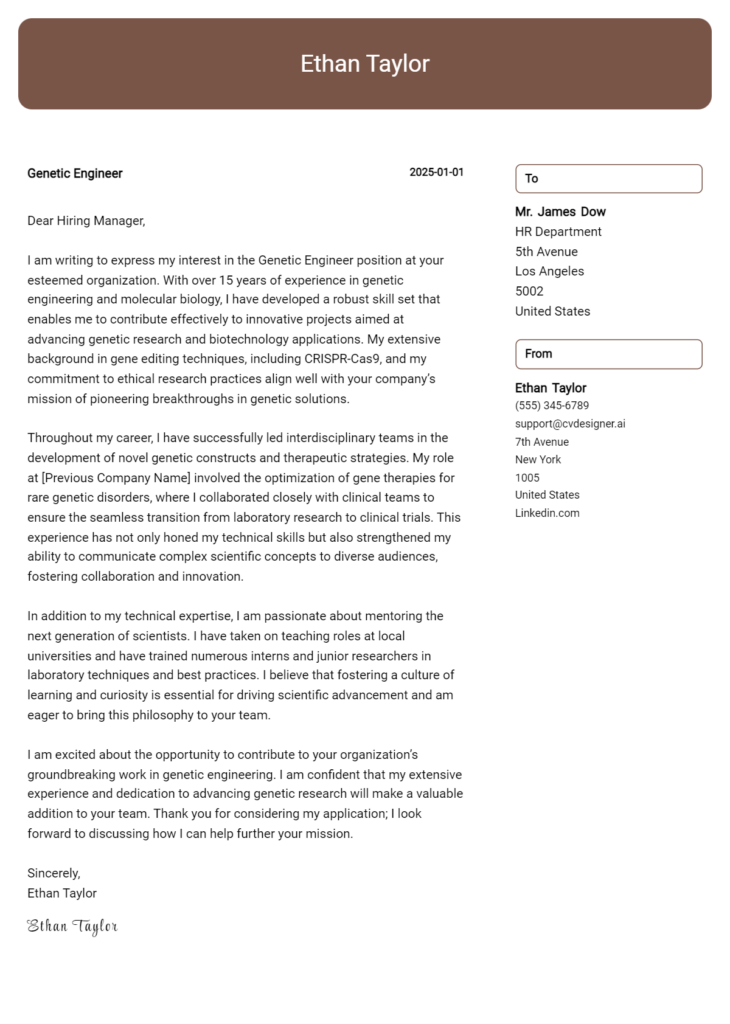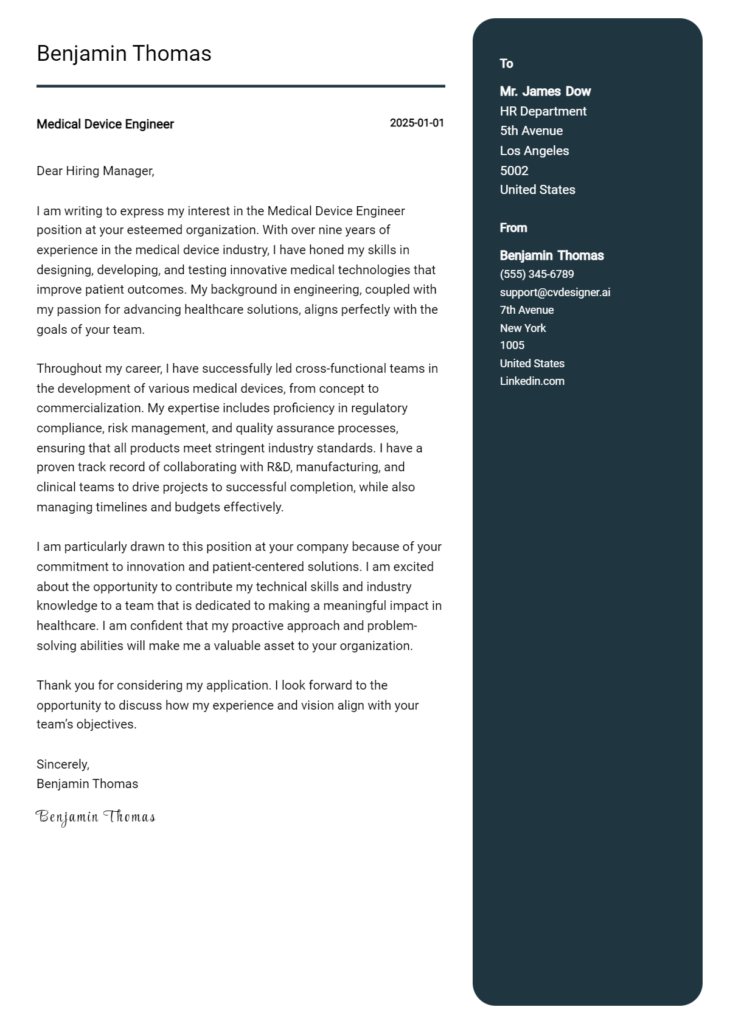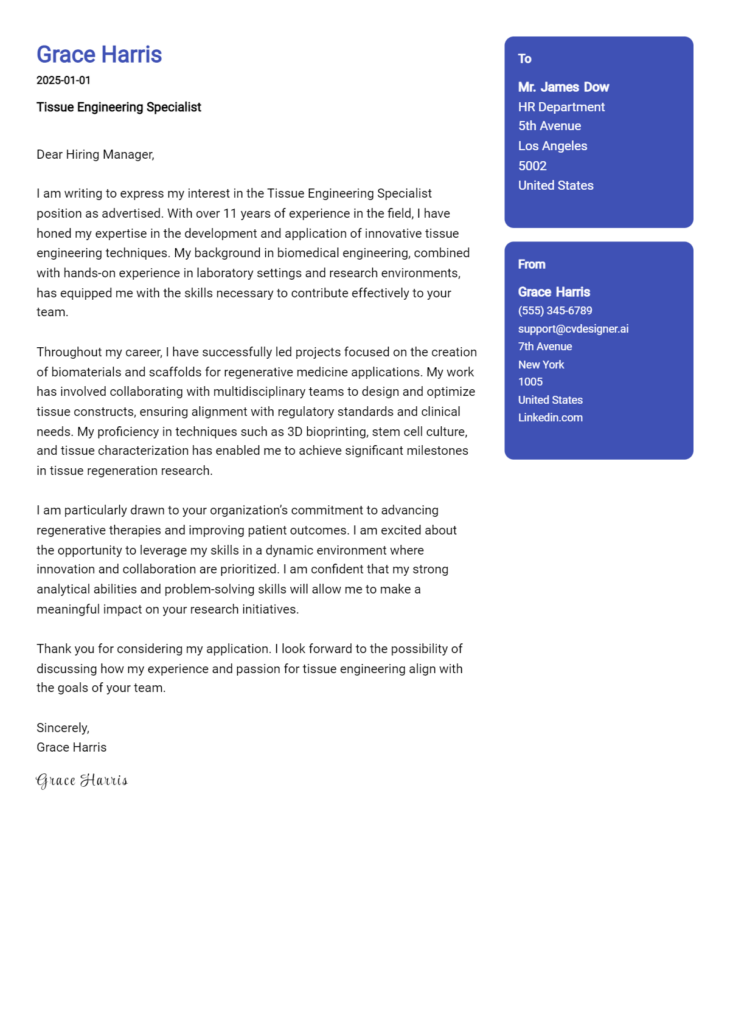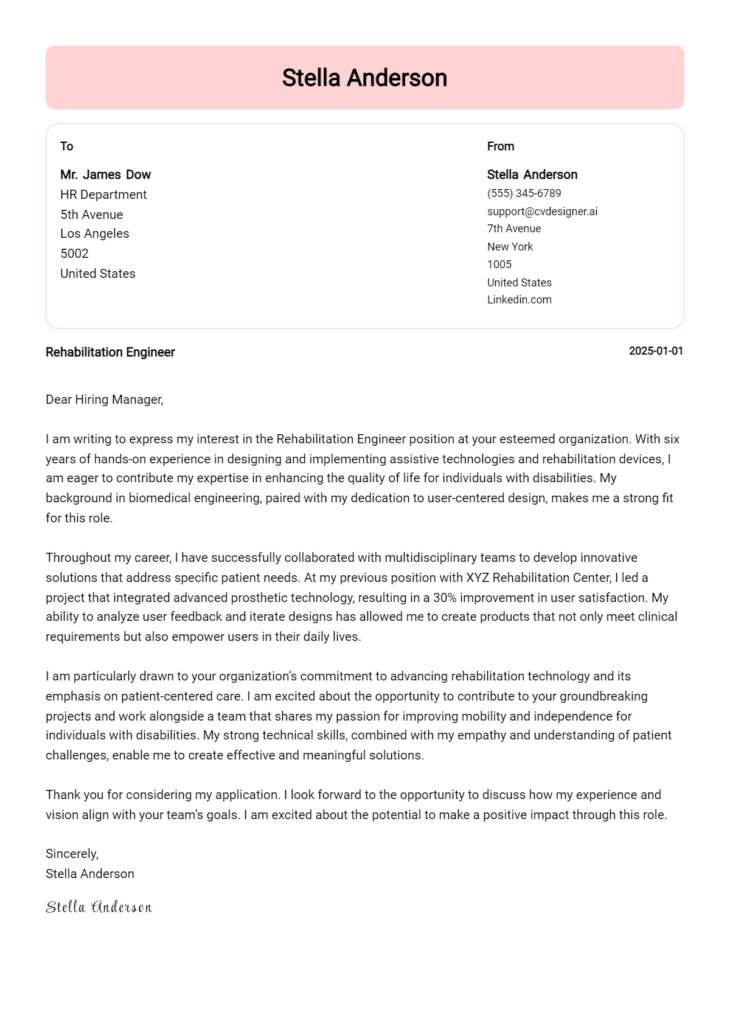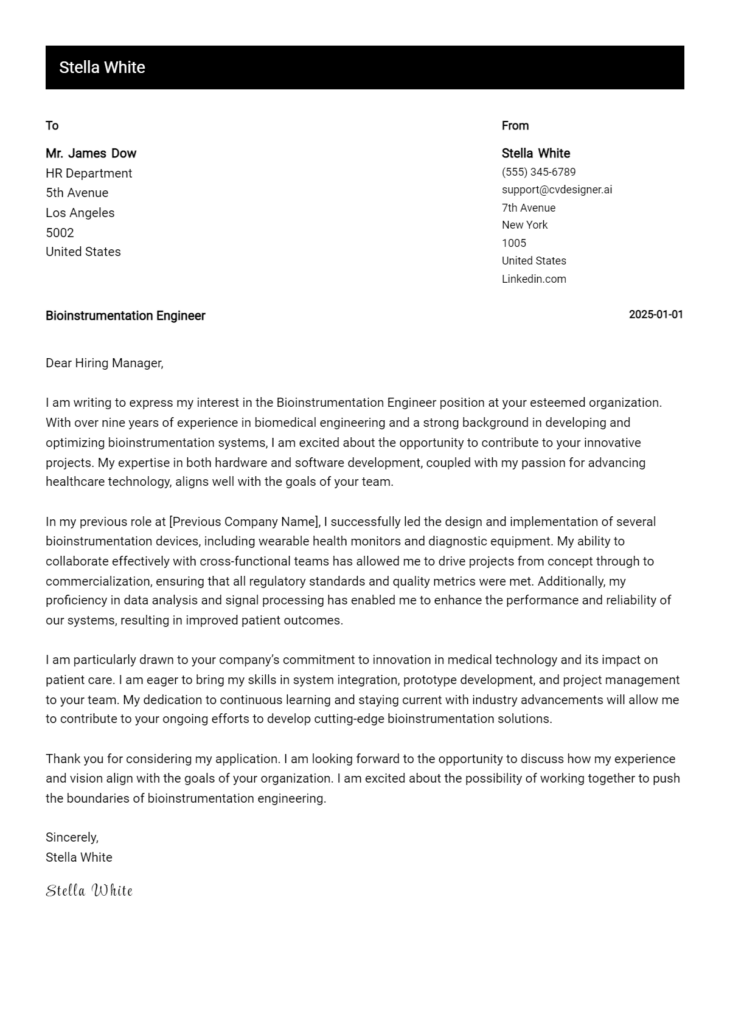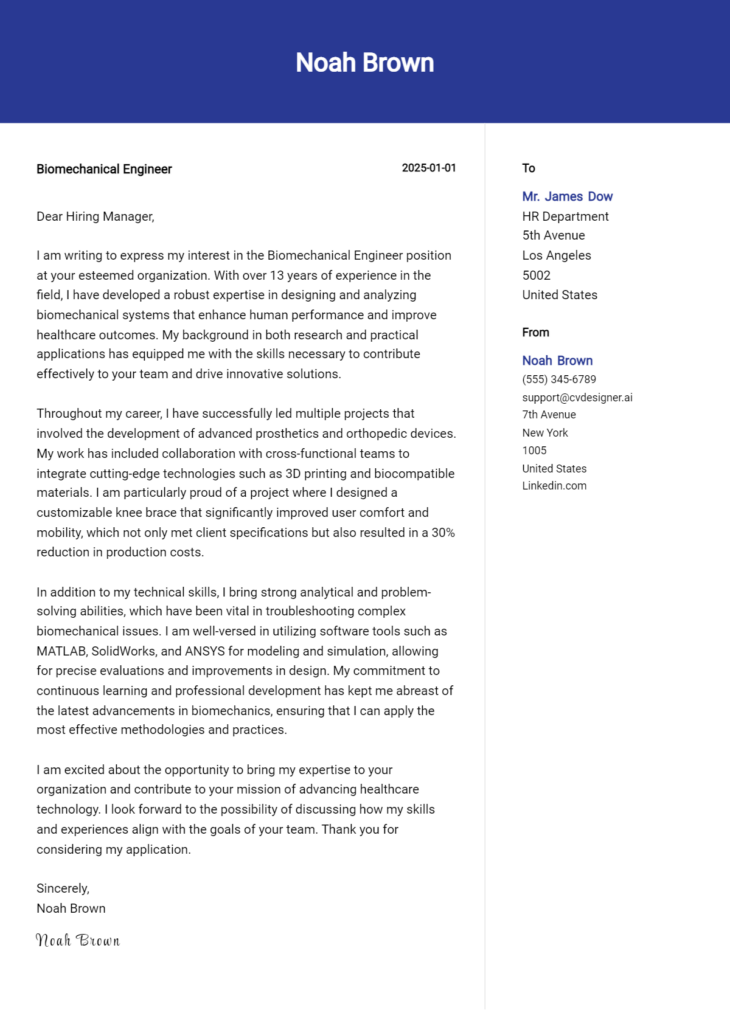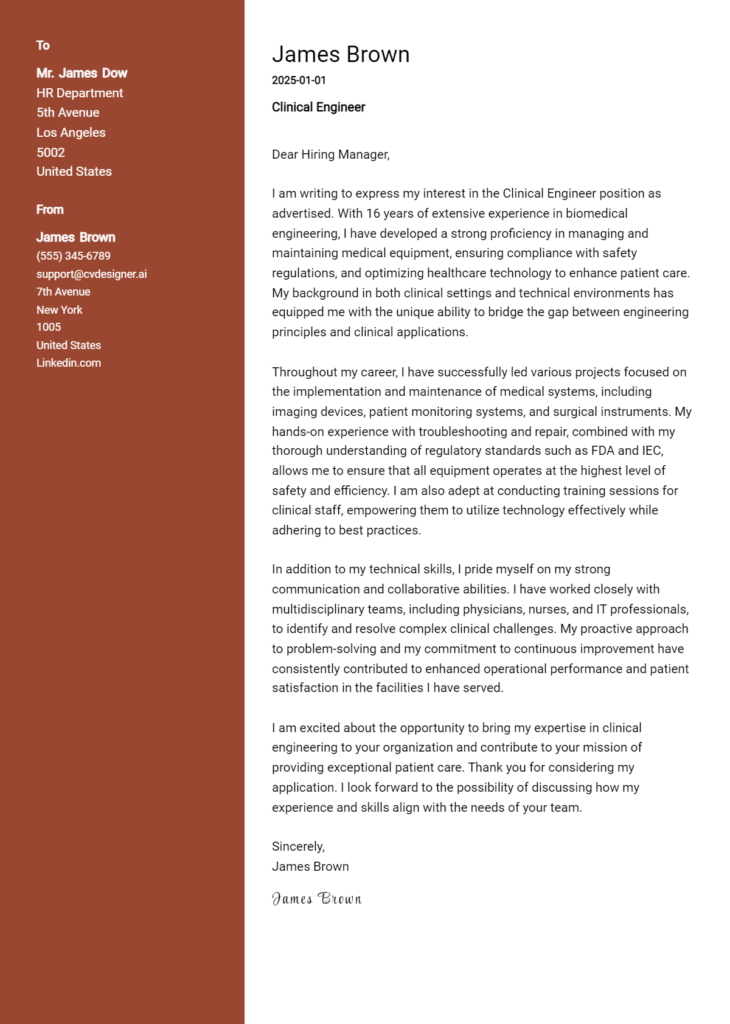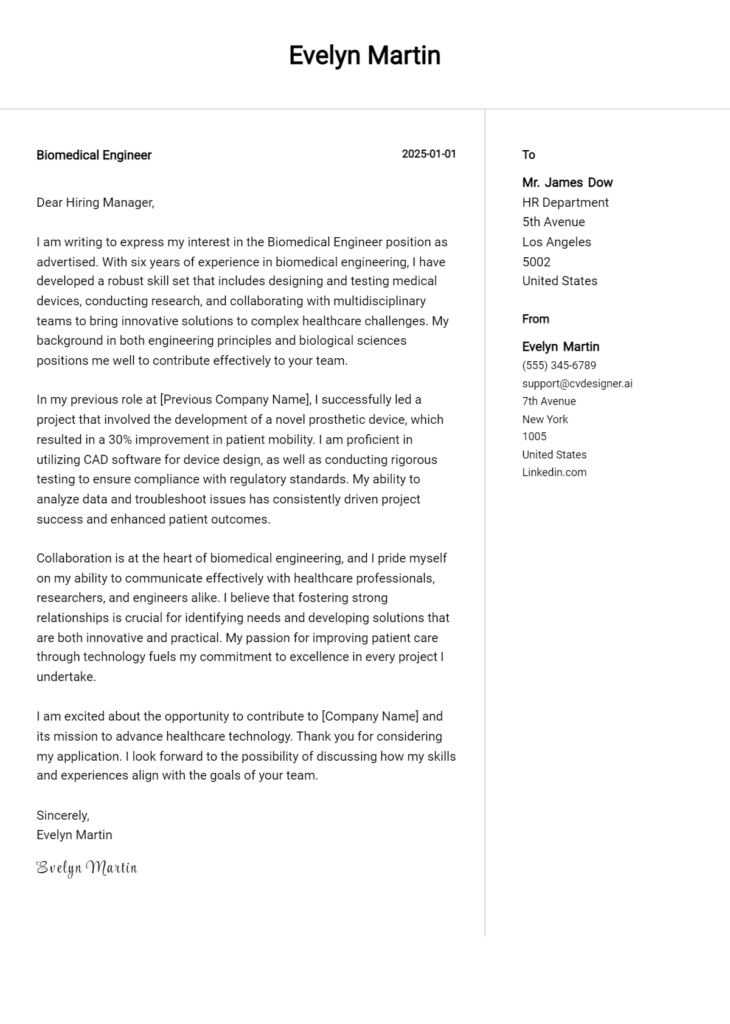Neuroengineering Specialist Cover Letter Examples
Explore additional Neuroengineering Specialist cover letter samples and guides and see what works for your level of experience or role.
How to Format a Neuroengineering Specialist Cover Letter?
Crafting a compelling cover letter is essential for a Neuroengineering Specialist, as it serves as your first opportunity to communicate your expertise and passion for the field. The format of your cover letter not only conveys your qualifications but also reflects your ability to think critically and approach complex problems—attributes that are vital in neuroengineering. A well-structured cover letter captures the attention of hiring managers while showcasing your methodical approach and innovative mindset.
In this guide, we’ll outline the necessary components of an effective cover letter, providing insights and neuroengineering-specific examples to help you create a persuasive document.
We will focus on the key elements of a professional cover letter, including:
- Cover Letter Header
- Cover Letter Greeting
- Cover Letter Introduction
- Cover Letter Body
- Cover Letter Closing
Each section is crucial for emphasizing your qualifications and professionalism. Let’s break down each part and demonstrate how to make your neuroengineering cover letter stand out.
Importance of the Cover Letter Header for a Neuroengineering Specialist
The cover letter header is a critical element that establishes the professionalism and clarity of your application as a Neuroengineering Specialist. It serves as the first impression for hiring managers, providing essential information that facilitates easy communication. A well-structured header should include your contact information, the date, and the recipient's details, ensuring that all parties can connect seamlessly. Clear and professional formatting not only reflects your attention to detail but also your understanding of industry standards.
Here are examples of strong and weak cover letter headers for a Neuroengineering Specialist:
Strong Example
John Doe 123 Neuro Lane Brain City, BC 12345 john.doe@email.com (123) 456-7890 October 1, 2023 Dr. Jane Smith Director of Neuroengineering Innovative Neurotech Solutions 456 Science Ave Tech Town, TC 67890
Weak Example
john d 1234 st email@domain.com 10/01/23 to whom it may concern
The Importance of a Cover Letter Greeting for a Neuroengineering Specialist
The greeting of a cover letter is a critical component that sets the tone for the entire document. It serves as the first impression for the hiring manager and can significantly influence their perception of the applicant. A well-crafted greeting demonstrates professionalism and a personal touch by addressing the recipient directly, which can make the candidate stand out in a competitive field like neuroengineering. To create a strong opening, it’s essential to avoid generic greetings such as "To Whom It May Concern." Instead, take the time to research the hiring manager's name and title, as this can reflect your commitment and attention to detail.
When writing your cover letter, remember that a personalized greeting can establish rapport and show that you have a genuine interest in the position. Here are some examples of strong and weak greetings for a Neuroengineering Specialist cover letter:
Strong Greeting Example
Dear Dr. Smith,
Weak Greeting Example
To Whom It May Concern,
The Importance of a Well-Crafted Cover Letter Introduction for a Neuroengineering Specialist
A well-crafted cover letter introduction is crucial for a Neuroengineering Specialist, as it sets the tone for the rest of the application. This initial paragraph serves as your first impression, capturing the hiring manager's attention and expressing your genuine interest in the role. It should succinctly highlight key skills or achievements relevant to neuroengineering, demonstrating your fit for the position. A strong introduction can distinguish you from other candidates, while a weak one may lead to your application being overlooked. Below are examples of both strong and weak introductions to illustrate this point.
Strong Example
Dear Hiring Manager, As an accomplished Neuroengineering Specialist with over five years of experience in developing innovative neural interfaces, I was excited to discover the opening at [Company Name]. My passion for optimizing brain-computer interactions, combined with my proven track record of successful projects that enhance neurological rehabilitation, makes me an ideal candidate for this position. I am eager to contribute my expertise to your groundbreaking research and development team.
Weak Example
Dear Sir or Madam, I am writing to apply for the Neuroengineering Specialist position. I have some experience in the field and think it might be a good fit for me. I am interested in neuroscience and technology, and I hope to work with your company.
Purpose of the Cover Letter Body for a Neuroengineering Specialist
The cover letter body for a Neuroengineering Specialist serves as a critical platform for candidates to demonstrate their technical expertise, relevant experience, and the unique value they can bring to the organization. It is an opportunity to delve into specific projects or accomplishments that highlight the candidate's proficiency in neuroengineering, such as developing neuroprosthetic devices or enhancing brain-computer interfaces. By showcasing these experiences, candidates can effectively convey how their skills align with the company's goals and contribute to its success. A well-crafted cover letter body not only highlights the applicant's qualifications but also illustrates their passion for innovation in the field of neuroengineering.
Strong Example
I am excited to apply for the Neuroengineering Specialist position at [Company Name], as my extensive background in developing advanced neuroprosthetic devices aligns perfectly with your team’s mission. During my tenure at [Previous Company], I led a project that successfully integrated machine learning algorithms with neural signal processing, resulting in a 30% improvement in user control for prosthetic limbs. This experience not only honed my technical skills but also deepened my understanding of user-centered design in neuroengineering. I am eager to bring my expertise in interdisciplinary collaboration and innovative problem-solving to [Company Name], contributing to groundbreaking advancements in neurotechnology.
Weak Example
I want to apply for the Neuroengineering Specialist job at your company. I have some experience in neuroengineering and think I could do a good job. I worked on a project related to brain-computer interfaces but didn't finish it. I believe working at [Company Name] would be a great opportunity for me to learn more and improve my skills. Thank you for considering my application.
Importance of the Cover Letter Closing for a Neuroengineering Specialist
The closing paragraph of a cover letter is crucial as it reinforces your qualifications, expresses enthusiasm for the position, and prompts the hiring manager to take action, such as reviewing your resume or scheduling an interview. For a Neuroengineering Specialist, it’s essential to communicate not only your technical expertise and passion for the field but also your eagerness to contribute to the organization’s goals. A well-crafted closing can leave a lasting impression and set you apart from other candidates.
Strong Example
Thank you for considering my application for the Neuroengineering Specialist position at [Company Name]. With a solid foundation in neural interface design and a passion for advancing neurotechnology, I am excited about the opportunity to contribute to your innovative projects. I look forward to the possibility of discussing how my skills can align with your team’s goals. Please feel free to review my resume for further details, and I would welcome the chance to schedule an interview at your earliest convenience.
Weak Example
I hope you think about my application for the Neuroengineering job. I have some experience and I might be a good fit. Please look at my resume. Thanks.
These tips will help candidates craft an effective cover letter for a Neuroengineering Specialist position. A well-written cover letter is essential to make a strong first impression, and it should effectively showcase your technical skills, problem-solving abilities, knowledge of the Software Development Life Cycle (SDLC), teamwork experience, and a passion for continuous learning. By highlighting these attributes, you can demonstrate your suitability for the role and your enthusiasm for contributing to advancements in neuroengineering.
Cover Letter Writing Tips for Neuroengineering Specialist
Highlight Technical Skills: Clearly outline your technical expertise related to neuroengineering, such as knowledge of neural interfaces, signal processing, and programming languages relevant to the field. Use specific examples of projects or research where you applied these skills. This not only shows your qualifications but also your ability to contribute effectively to the team.
Emphasize Problem-Solving Abilities: Neuroengineering often involves tackling complex challenges. Provide examples of how you have successfully identified problems and implemented innovative solutions in previous roles or academic projects. This demonstrates your analytical mindset and your capability to handle the unique challenges within neuroengineering.
Showcase Your Knowledge of SDLC: Discuss your familiarity with the Software Development Life Cycle and how it applies to neuroengineering projects. Mention specific methodologies you have experience with, such as Agile or Waterfall, and how they helped streamline project development. This understanding is crucial for collaborating with software teams and ensuring project success.
Illustrate Teamwork Experience: Neuroengineering projects often require collaboration across multidisciplinary teams. Share instances where you have worked effectively in a team setting, highlighting your ability to communicate ideas clearly and contribute to group goals. This will show potential employers that you can thrive in a collaborative environment.
Express a Passion for Continuous Learning: The field of neuroengineering is constantly evolving, and a commitment to continuous learning is vital. Mention any professional development courses, certifications, or workshops you have attended, as well as any relevant literature you have read. This conveys your dedication to staying updated with the latest advancements and your eagerness to grow in your career.
For additional assistance in crafting your cover letter, consider utilizing cover letter templates or a cover letter builder to ensure your application stands out.
Common Mistakes to Avoid in a Neuroengineering Specialist Cover Letter
Crafting a compelling cover letter is essential for standing out in the competitive field of neuroengineering. Avoiding common mistakes can significantly enhance your chances of making a positive impression on potential employers. Here are some pitfalls to watch for and tips to steer clear of them:
Generic Greetings: Using vague salutations like "To Whom It May Concern" can make your cover letter feel impersonal. Instead, research the hiring manager's name and address them directly.
Vague Language: Failing to specify your skills and experiences can lead to a lackluster letter. Clearly articulate your qualifications and how they relate to the neuroengineering role you're applying for.
Rehashing Your Resume: Simply reiterating what is on your resume without adding context or insights can be uninspiring. Use the cover letter to highlight key achievements and provide a narrative that showcases your passion for neuroengineering.
Ignoring the Job Description: Not tailoring your cover letter to the specific job can demonstrate a lack of interest. Make sure to align your skills with the requirements listed in the job description.
Poor Formatting: A cluttered or unattractive layout can detract from your message. Adhere to a professional cover letter format to ensure clarity and readability.
Neglecting Proofreading: Spelling and grammar errors can undermine your professionalism. Always proofread meticulously or use tools to catch mistakes before submitting.
Lack of Enthusiasm: Failing to convey genuine enthusiasm for the position may lead to a lukewarm reception. Share why you are passionate about neuroengineering and how it aligns with your career goals.
By steering clear of these common mistakes, you can create a persuasive cover letter that effectively communicates your qualifications and enthusiasm for the role. For inspiration, explore cover letter examples that can help you craft your unique narrative.
Cover Letter FAQs for Neuroengineering Specialist
What should I include in my cover letter for a Neuroengineering Specialist position?
A well-structured cover letter for a Neuroengineering Specialist position should include your contact information, a greeting, and a strong opening statement that captures the hiring manager's attention. Highlight your relevant educational background, such as a degree in biomedical engineering or neuroscience, and detail your technical skills, including experience with neuroimaging, neural interface design, or signal processing. Additionally, mention any research or projects you’ve completed in the field. Be sure to convey your passion for neuroengineering and how your skills align with the company’s objectives. Finally, include a closing statement that expresses your enthusiasm for the role and your desire to discuss your qualifications further.
How can I demonstrate my passion for neuroengineering in my cover letter?
To effectively convey your passion for neuroengineering, share personal anecdotes or experiences that illustrate your commitment to the field. For instance, mention a specific project or research paper that inspired you, or describe an internship where you developed relevant skills. You can also discuss your future aspirations in neuroengineering, such as advancing brain-computer interfaces or improving neuroprosthetics. Additionally, including any extracurricular activities, volunteer work, or professional organizations related to neuroscience or biomedical engineering can further showcase your dedication. By combining these elements, you can create a compelling narrative that highlights both your expertise and your enthusiasm for the field.
Should I tailor my cover letter for each job application?
Absolutely! Tailoring your cover letter for each job application is essential for making a strong impression. Employers appreciate candidates who take the time to research their organization and understand the specific requirements of the position. Begin by analyzing the job description and identifying key qualifications and responsibilities. Then, customize your cover letter to highlight your relevant skills, experiences, and achievements that align with those criteria. Mention specific projects or accomplishments that demonstrate your capability in the areas emphasized in the job listing. This personalized approach not only showcases your genuine interest in the position but also increases the likelihood of your application being noticed.
What tone should I use in my cover letter?
Your cover letter should convey a professional yet approachable tone. As a Neuroengineering Specialist, you want to reflect both your technical expertise and your ability to communicate complex ideas effectively. Start with a formal greeting and maintain professionalism throughout the letter, using clear and concise language. However, don’t hesitate to infuse your personality into your writing—an enthusiastic tone can help illustrate your passion for the field. Use active voice and avoid overly complex jargon unless absolutely necessary. Remember to be respectful and courteous while also expressing your eagerness for the opportunity. Striking the right balance will help you make a positive impression on potential employers.
Build your Cover Letter in minutes
Use an AI-powered cover letter builder and have your letter done in 5 minutes. Just select your template and our software will guide you through the process.

